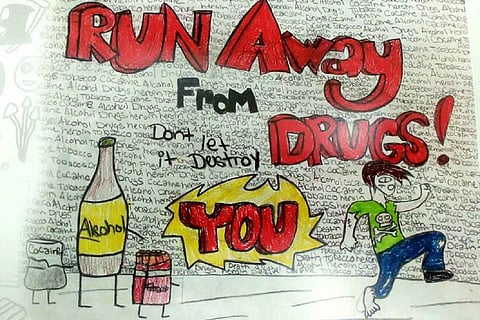

The caller sounded frantic. He has never seen his dad like this. The 67-year-old has been digging the ground in the backyard of the house with sticks and rods. The old man seemed convinced there was a dead body buried there. He scared the family.
At the other end of the call, a counsellor listened patiently to the son’s woes. That call is one of the more than 760 calls that have come to Vimukthi, Kerala government’s anti-narcotics campaign, since the lockdown for COVID-19 began in the country, and the sale of alcohol stopped.
The caller’s father has been exhibiting a classic symptom of alcohol withdrawal syndrome – hallucination that occurs for severe cases. “We have divided the cases into three – mild, moderate and severe. The mild includes not so problematic symptoms, such as lack of sleep and excessive sweating and dehydration. When it is moderate, there would be shivering (mostly of the hand), or pain in some part of the body. In severe cases, one can observe behavioural issues – incoherent speeches and hallucinations,” says Vinu Vijayan, a sociologist at the Excise Deparment that runs Vimukthi. There are counselling and de-addiction centres working under Vimukthi.
From March 24 to April 26, Vimukthi has received 1,259 out-patients, 182 in-patients and 764 calls at the counselling centre. However, the numbers are not unusual, says Arun, an employee at Vimukthi. Only, the cases that come now are mostly alcohol withdrawal syndromes, unlike in other months when young people suffering from substance abuse would call for help.
“In the first few days after the lockdown began, there has been more number of calls. And 90% of these have been for alcohol withdrawal syndrome. Sometimes, it is as bad as a patient not being able to identify his own house, stepping into another and making an issue.
However, after April 10, the calls have reduced a lot,” Vinu says. He reckons this is because, in both mild and moderate cases, patients would have been able to overcome the difficulties in a few days.
“The problem comes when they suddenly need to refrain from the daily habit of drinking. As days pass, however, their physique and appetite develop. Even for severe cases, the first seven days are the most crucial. We call it the detoxification period, to assess the reaction,” he explained.
The cases are referred to the de-addiction centres of Vimukthi – there is one in every district, with 15 to 20 beds each. When more cases come, they would be sent for treatment at the primary and community health centres. They would be given critical care treatment and medication. However, during the COVID-19 pandemic, unless it is absolutely necessary, patients are not encouraged to come to the hospital, if they have already overcome the initial hiccup.
“Many patients want to do the long term de-addiction so that once the lockdown is over they would not be under the influence again. They have understood how difficult it is going through the withdrawal syndrome and do not wish to go through it again. For these people, we offer telephone counselling until the lockdown is over and then they can look for hospital options,” Vinu adds.
He also notes that what makes it easier for some to overcome the problem is family support. A man in his 60s once called Vimukthi for help. He had earlier been dependent on alcohol and got over the alcoholism with the support of his family – he spent time talking to his grandchildren, got busy with farming and watched television with others. He called the counselling centre not for himself but a friend of his who was also dealing with alcoholism. He was a divorcee and lived alone. When the lockdown came, he refused to see anyone and slipped into depression, unable to get a drink.
“The problem is, everyone need not reach out for help. People may, in their desperation, try to substitute the drinks with other spirits. We get calls asking if it is okay to consume the sanitiser, which has alcohol content in it,” Vinu says.
Sam Christy Daniel, Additional Commissioner, Enforcement Excise Department, says that a couple of cases of people trying to sell sanitiser as a substitute for alcohol have been caught - once in Muvattupuzha and another time in Palakkad. “We have also caught 1,970 litres of Ayurvedic preparation, which is fermented and claims to have 14% alcohol. This is, however, not unusual, and you can say there have not been many cases of spurious liquor since the lockdown,” he says.
Toll free number of Vimukthi Call Centre is 14405.